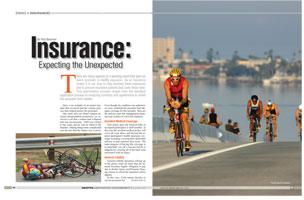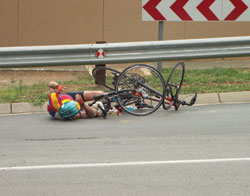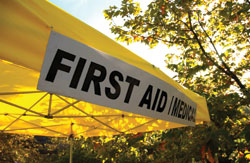
There are many aspects of a sporting event that opens an event promoter to liability exposure. As an insurance broker it is our duty to help examine these exposures and to procure insurance policies that cover those risks. This examination process ranges from the standard application process to analyzing contracts and agreements to shield the promoter from liability.
Here is an example of an actual incident that occurred and the various policies that helped protect the promoter:
 One week into our client's largest national ultra marathon promotion, we received a call that a runner has collapsed and is unconscious. EMS was rushed to the scene and he was air lifted to the hospital. Making things more complicated is the fact that the runner is a minor. Even though his condition was unknown, we were confident the promoter had adequate coverage for this incident. Here are the policies and risk management measures put in place to cover this situation.
One week into our client's largest national ultra marathon promotion, we received a call that a runner has collapsed and is unconscious. EMS was rushed to the scene and he was air lifted to the hospital. Making things more complicated is the fact that the runner is a minor. Even though his condition was unknown, we were confident the promoter had adequate coverage for this incident. Here are the policies and risk management measures put in place to cover this situation.
Accident Medical Coverage
This policy pays the medical bills of an injured participant or staff member. In this case the accident medical policy will cover all costs above and beyond the injured participant's health insurance coverage including covering their deductible and any co-pay expenses they incur. The main purpose of having this coverage is to hopefully cut off a lawsuit before it happens by covering all of the hard costs associated with an injury.
General Liability
General Liability Insurance will pay up to the policy limit all sums that the Insured becomes legally obligated to pay due to Bodily Injury and Property Damage claims to which the insurance policy applies.
In this case if the runner decides to sue the promoter for negligence due to his injury, the general liability policy will pay for legal defense costs and any judgments levied against the promoter up to the limit of the policy.
Participant Waivers
All participants were required to sign a participant waiver of liability. This document was drafted by an attorney with experience in drafting sporting event waivers. The main purpose of this document is the release the race promoter from any liability relating to the injury or death of a participant. The hope here is that if the runner was to sue that the waiver could prevent this from happening since the waiver points out that the participant is well aware of the inherent danger of such an event.
EMT's
Naturally there were EMT's hired for this event. We made sure that the EMT's hired carried their own general liability insurance policy and name the race promoter as additional insured on their policy. The reason for this is that if the race promoter is sued over the EMT's negligence, the EMT's insurance policy will pickup the claim.
 Aid Stations
Aid Stations
We had asked the insured for a layout of the race and the positioning of all aid stations. Generally it is desirable to have these stations every two to four miles apart so runners can replenish food and drink or take a short break if needed.
So back to how the story ends…
After a short stay in the hospital to rehydrate the runner, he made a full recovery. His medical bills were paid by the insurance company and no lawsuit has been filed to date.
The following are some other coverages and risk management involved in a major sporting event:
Workers' Compensation
It will take hundreds of employees, contract labor, personnel and volunteers to allow the event to run smoothly. While it is mandatory in most states, this issue is often overlooked by festival organizers. Most health insurance policies will not cover work related injuries and rely on a workers' compensation policy to pick up the expenses of a work related injury. If no workers' compensation insurance is in place and a worker has an injury, the company could be liable for the medical expenses and long term care of the injured employee.
Contractual Review
Often the organizers will sign agreements without reviewing the insurance provisions leaving them exposed for limits and coverage that you may not even have. Common issues are Waiver of subrogation in favor of the venue, hold harmless clauses that are one-sided, excess liability limits that are above the standard coverage and third party property damage requirements.
All the contracts with the suppliers, venue and sponsors should be reviewed by the insurance company. It is important to limit the liability exposure of our client by transferring the risk where it belongs and to make sure that each party is responsible for their own liability and not assuming the liability of a 3rd party contractor.
Equipment coverage
This is an area that always seems to cause confusion. Some equipment rental houses carry their own equipment insurance while others require the event promoter to carry coverage for equipment in their "care, custody and control". With millions of dollars in equipment exposed, this is an essential element in the risk management program. While there will always be last minute changes and additions as long as we prepare the underwriter in advance we can make sure the client is fully covered for this exposure.
Business Auto Coverage
The most important coverage here is called Hired and Non-Owned Auto liability. This provides liability coverage for autos not owned by the company and used for business purposes. This includes both autos owned by employees as well as autos rented for the event. The importance here is that most individuals only carry a relatively low liability limit on their personal auto policy. In addition the personal auto policy may not react to a claim stemming from a rented auto. If they trigger a claim while acting in a business capacity, the injured party can sue not only the driver but the company who employed the driver. The general liability coverage excludes auto so it is advisable for all insureds to get this extra layer of protection. It is very important to run a motor vehicle report (MVR) on all employees to make sure they have valid driver's licenses and no serious violations. It is also important to make sure your employee's auto insurance is valid and complies with state requirements.
3rd Party Coverage
Dozens of vendors, suppliers, sponsors and other 3rd party contractors will be on site during the event. Their insurance requirements need to be clearly outlined in standardized contract and signed prior to the event. In addition, these 3rd parties must provide a certificate naming the organizer as additional insured with minimum liability, auto and workers' compensation limits clearly outlined. They cannot enter the festival grounds until the certificate is received and coverage is confirmed as any claims they trigger will not be covered by the event promoters' policy.
 Some of these 3rd parties may have their own insurance requirements that must be met by the event promoter as well. It is important to review these to be sure the promoter complies with the requirements prior to the start of the event. This is part of the contractual review process.
Some of these 3rd parties may have their own insurance requirements that must be met by the event promoter as well. It is important to review these to be sure the promoter complies with the requirements prior to the start of the event. This is part of the contractual review process.
Event Cancellation/Weather
This is a key coverage to protect the event promoter's investment. Coverage premium is based on the total event budget and although it can be quite expensive, not having it can prove financially devastating. There are many factors that can cause an event to cancel including such things as severe weather and wildfires that create an unsafe condition for the event to continue. If the event is to cancel the promoter will be reimbursed not only for the hard costs that went into the event but if they choose they can also get the estimated profit that the event was going to earn.
Weather Insurance helps to supplement the organizer's revenue should they experience rain, wind, lighting or other defined perils causing cancellation or decreased revenues.
As you can tell there is a lot that goes into properly covering an event. It is more than simply purchasing a policy. The goal is to stop a claim before it happens. This is not only good for the insurance company, it is good for the event promoter's business as well. Claims make insurance more expensive as well as bad PR both of which a promoter can do without.

